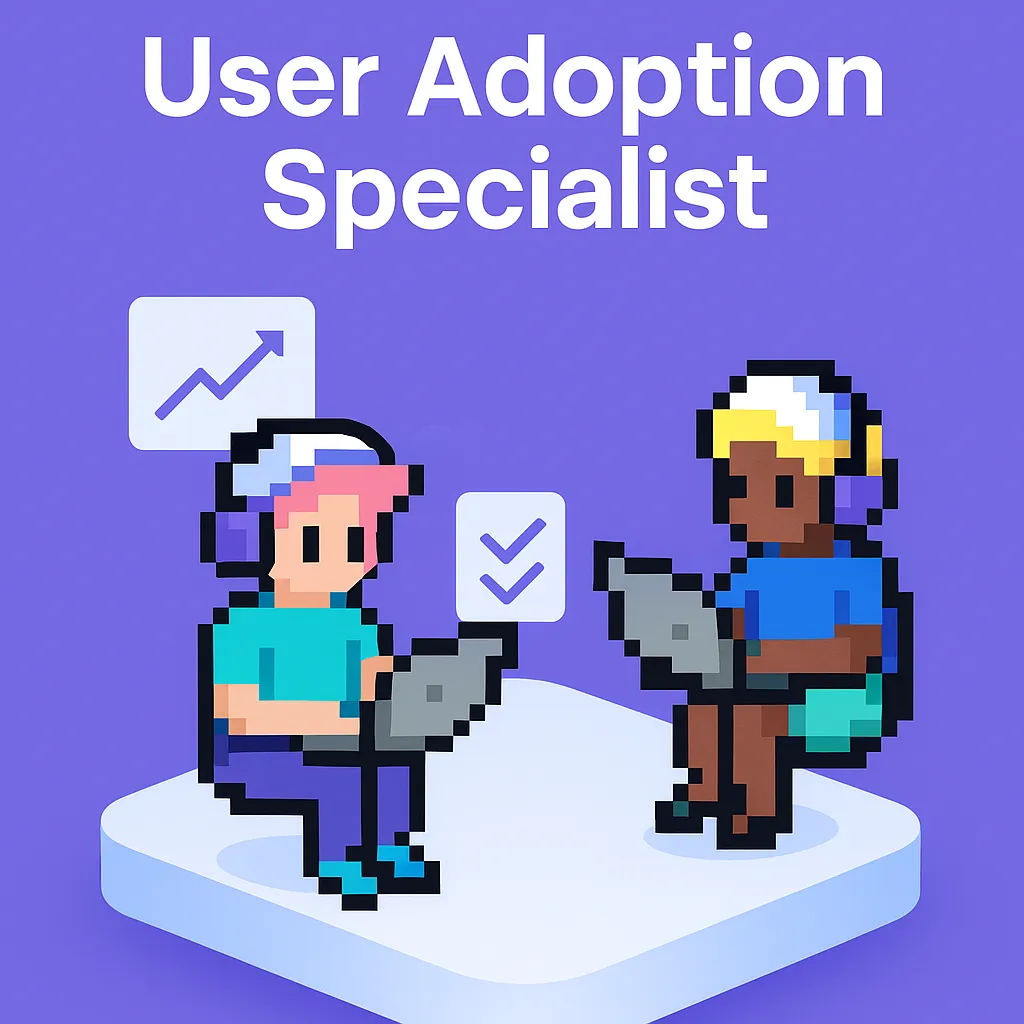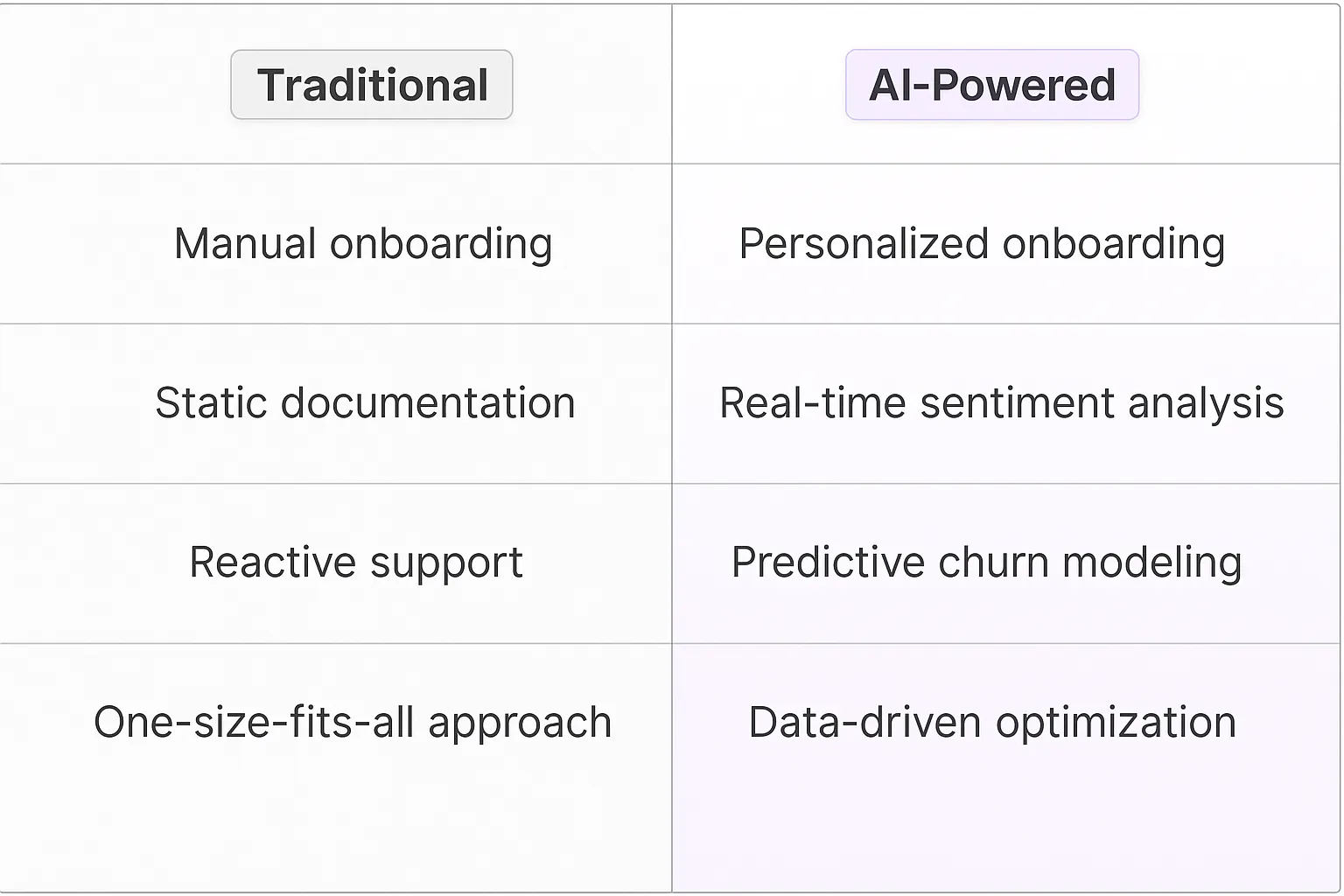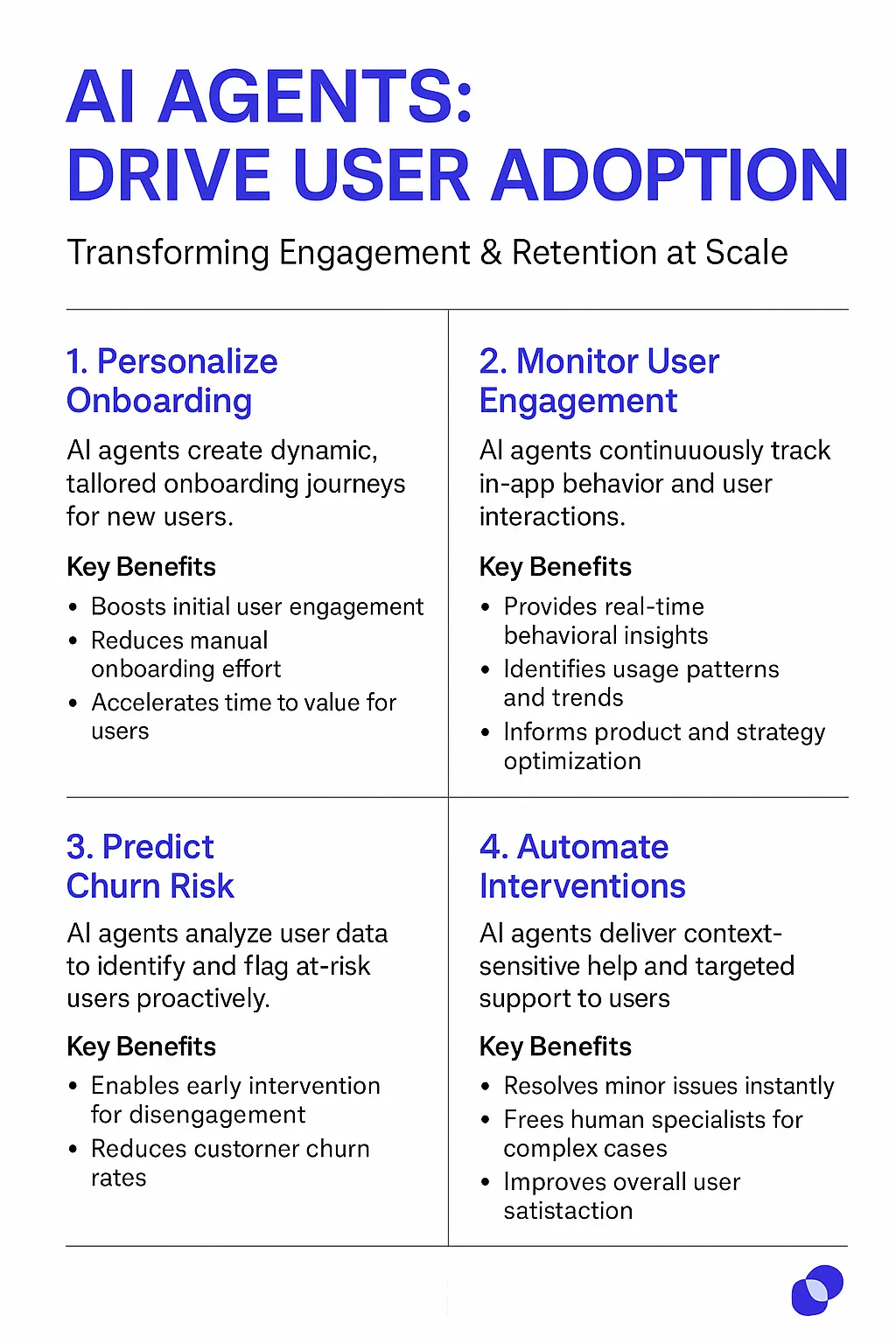A User Adoption Specialist is a professional dedicated to ensuring that users effectively integrate new software or technologies into their workflows. These specialists traditionally relied on a mix of training sessions, documentation, and personalized support to guide users through the adoption process. However, the landscape is rapidly evolving with the introduction of AI agents.
User Adoption Specialists, enhanced by AI agents, now offer a suite of powerful features:1. Personalized onboarding experiences tailored to individual user profiles and behaviors.2. Real-time analysis of user engagement and sentiment.3. Predictive churn modeling to identify at-risk users before they disengage.4. Automated generation of help content and FAQs based on user interactions.5. Intelligent chatbot support available 24/7 to address user queries.6. Data-driven insights to continuously optimize the adoption process.7. A/B testing capabilities to refine adoption strategies across different user segments.

Before AI agents entered the scene, user adoption specialists relied on a hodgepodge of tools and manual processes. They'd spend hours poring over spreadsheets, crafting personalized onboarding emails, and scheduling endless check-in calls. It was a high-touch, time-intensive approach that often left teams stretched thin and users feeling overwhelmed.
The old playbook involved creating static documentation, running webinars that users would inevitably miss, and hoping that a one-size-fits-all approach would somehow stick. Spoiler alert: it rarely did. User adoption was more art than science, with success often hinging on the charisma of individual team members rather than scalable, data-driven strategies.
Enter AI agents, and suddenly we're playing a whole new ballgame. These digital teammates are like having a fleet of hyper-intelligent, never-sleeping user adoption specialists at your fingertips. They're not just automating tasks; they're fundamentally reshaping how we think about user engagement and software adoption.
First off, AI agents bring personalization to a whole new level. They can analyze user behavior in real-time, identifying pain points and opportunities for engagement that human eyes might miss. This means every user gets a tailored experience, increasing the likelihood they'll stick around and actually use the software.
But here's where it gets really interesting: AI agents can predict churn before it happens. By analyzing patterns of user behavior, they can flag at-risk accounts and trigger interventions before a user even thinks about jumping ship. It's like having a crystal ball for your user base.
Moreover, these AI agents are learning machines. Every interaction, every data point, feeds into their algorithms, making them smarter and more effective over time. This creates a virtuous cycle of continuous improvement that's hard to replicate with human-only teams.
Perhaps most importantly, AI agents free up human specialists to focus on high-value, strategic work. Instead of getting bogged down in repetitive tasks, your team can focus on building relationships, crafting strategy, and diving deep into the nuanced aspects of user psychology that truly move the needle on adoption.
In essence, AI agents are turning user adoption from a reactive, hit-or-miss endeavor into a proactive, data-driven science. They're not just changing the game; they're rewriting the rules entirely. And for companies serious about driving user adoption at scale, that's a game-changer you can't afford to ignore.

User adoption specialists face the constant challenge of getting people to embrace new technologies. AI agents can be game-changers in this field, acting as digital teammates to amplify human efforts. Let's dive into some concrete ways these AI-powered allies can transform the user adoption landscape:
Beyond high-level processes, AI agents can take on specific tasks that traditionally eat up a user adoption specialist's time and energy:
The beauty of these AI-powered use cases is that they don't replace the human touch in user adoption – they amplify it. By offloading repetitive tasks and providing data-driven insights, AI frees up specialists to focus on high-impact, strategic work that truly moves the needle on adoption rates.
As we see AI agents take on more of these roles, the job of a user adoption specialist will evolve. The most successful professionals in this field will be those who learn to leverage AI as a force multiplier, combining machine intelligence with human creativity and empathy to drive unprecedented levels of software adoption.
Implementing effective retention strategies becomes crucial as AI agents help identify patterns that predict user disengagement, allowing for proactive interventions.

User adoption specialist AI agents are reshaping how businesses approach software implementation and user onboarding. These digital teammates bring a unique blend of data-driven insights and personalized guidance that's transforming the landscape across sectors. Let's dive into some concrete examples of how these AI agents are making waves in different industries, showcasing their ability to enhance user experiences and drive adoption rates through the roof.
From tech startups to established enterprises, organizations are leveraging these AI-powered specialists to crack the code on user engagement and retention. They're not just tools; they're becoming integral team members, working alongside human specialists to create seamless, intuitive user journeys. The impact is tangible - we're seeing faster time-to-value for new users, reduced churn rates, and a significant uptick in feature utilization across the board.
What's particularly exciting is how these AI agents are adapting to the unique challenges of each industry. They're not one-size-fits-all solutions, but rather chameleons that mold themselves to fit the specific needs of healthcare, finance, education, and beyond. This adaptability is key to their success and widespread adoption.
Companies are increasingly turning to specialized roles like the User Adoption Specialist to ensure their AI implementations drive real business value and user satisfaction.
The fintech industry is ripe for disruption by User Adoption Specialist AI agents. These digital teammates can transform how financial apps onboard and retain users, addressing a critical pain point in the sector.
Take a mobile banking app, for instance. The typical user journey is fraught with friction: complex sign-up processes, confusing interfaces, and features that go undiscovered. Enter the AI User Adoption Specialist.
This AI agent acts as a personalized guide, analyzing user behavior in real-time and intervening at crucial moments. When a new user opens the app, it doesn't just throw a generic tutorial at them. Instead, it crafts a tailored onboarding experience based on the user's age, financial goals, and tech-savviness.
For a millennial first-time investor, the AI might prioritize introducing features like micro-investing or round-up savings. For a Gen X user more focused on retirement planning, it could highlight portfolio management tools and tax optimization features.
But the AI's role doesn't end at onboarding. It continuously monitors user engagement, identifying drop-off points and underutilized features. If a user hasn't set up direct deposit after a week, the AI might send a personalized notification explaining the benefits and offering a step-by-step guide.
The AI can also predict churn before it happens. By analyzing patterns of decreasing engagement, it can trigger retention campaigns. These aren't your typical "We miss you" emails. The AI might offer personalized financial insights or exclusive access to new features, addressing the specific reasons why that user might be losing interest.
What's game-changing here is the scalability. While human customer success teams can only handle a limited number of high-touch interactions, an AI User Adoption Specialist can provide personalized guidance to millions of users simultaneously.
The result? Higher activation rates, increased feature adoption, and significantly reduced churn. In an industry where user acquisition costs are sky-high, this level of retention is a game-changer.
As fintech companies battle for market share, those leveraging AI User Adoption Specialists will have a decisive edge. They're not just building better products; they're ensuring those products actually get used to their full potential. And in the end, that's what separates the unicorns from the also-rans in the cutthroat world of fintech.
The e-commerce landscape is a battlefield, and the weapons of choice are no longer just price and selection. The new frontier? User adoption and engagement. This is where AI User Adoption Specialists are becoming the secret sauce for e-commerce giants and upstarts alike.
Let's zoom in on a mid-sized fashion e-tailer. They've got great products, competitive prices, but they're struggling with cart abandonment and low repeat purchase rates. Enter the AI User Adoption Specialist.
This isn't your grandmother's chatbot. We're talking about a sophisticated AI that's part personal shopper, part retention specialist, and part data scientist. It's constantly learning from user behavior, making micro-adjustments to the user experience in real-time.
When a new user lands on the site, the AI doesn't just show them the latest collection. It analyzes their browsing patterns, compares them to similar user profiles, and starts curating a personalized experience. If the user lingers on boho-chic dresses, the AI might subtly reorganize the homepage to feature more of that style.
But here's where it gets interesting. The AI notices that users who buy boho dresses often abandon their carts when looking at accessories. It hypothesizes that they're overwhelmed by choice. So, it starts testing different ways of presenting accessories to these users. Maybe it's a curated "complete the look" section, or perhaps it's spacing out accessory recommendations over several sessions.
The AI is also working overtime on retention. It's not just sending out bland "10% off your next purchase" emails. It's crafting hyper-personalized re-engagement campaigns. For a user who browsed sustainably-made clothing but didn't purchase, the AI might send an email highlighting the brand's eco-friendly practices, along with a selection of items that match their style preferences.
What's mind-blowing is the scale at which this operates. This AI is simultaneously running thousands of micro-experiments, constantly optimizing the user experience for each individual. It's like having a million growth hackers working 24/7.
The results? We're seeing double-digit improvements in key metrics. Cart abandonment rates plummet. Repeat purchase frequency skyrockets. And perhaps most importantly, customer lifetime value goes through the roof.
This isn't just about making more sales. It's about creating a virtuous cycle of engagement. The more a user interacts with the platform, the better the AI understands them, leading to even more relevant experiences, which in turn drives more engagement.
In the cutthroat world of e-commerce, where switching costs for consumers are virtually zero, this level of personalized engagement becomes a moat. It's not just about having the right products at the right price. It's about creating an experience that feels tailor-made for each user, at scale.
The e-commerce players who nail this - who effectively deploy AI User Adoption Specialists to create these hyper-personalized experiences - they're the ones who will win in the long run. They're not just selling products; they're building relationships. And in e-commerce, relationships are the ultimate competitive advantage.
Implementing a User Adoption Specialist AI Agent isn't just about flipping a switch. It's a complex dance of technology and human behavior. First off, you're dealing with the integration hurdle. Your AI needs to play nice with existing systems, from CRMs to analytics tools. It's like trying to add a new instrument to an orchestra mid-performance – tricky, but not impossible.
Then there's the data challenge. Your AI is only as good as the data it's fed. You need clean, comprehensive user data to train this digital teammate effectively. But let's be real – most companies' data is a mess. It's scattered across systems, full of gaps, and often outdated. Cleaning this up is like digital archaeology, time-consuming and tedious, but absolutely crucial.
Lastly, there's the ever-present issue of scalability. As your user base grows, can your AI keep up? It needs to handle increased load without breaking a sweat. This isn't just about raw processing power – it's about maintaining quality interactions at scale. Your AI needs to be as attentive to your millionth user as it was to your first.
On the operational side, you're looking at a whole different set of hurdles. First up: the human factor. Your team needs to be on board with this AI adoption specialist. There's often resistance – people worry about job security or don't trust the tech. You need to sell this internally as a tool that amplifies human capabilities, not replaces them.
Then there's the question of governance. Who's in charge of this AI? Who decides what it can and can't do? You need a clear chain of command and decision-making process. Without it, you risk your AI becoming a loose cannon, potentially damaging user relationships or even violating regulations.
Speaking of regulations, that's another minefield. Data privacy laws are getting stricter by the day. Your AI needs to be compliant with GDPR, CCPA, and whatever new acronym regulators come up with next. This isn't just about avoiding fines – it's about maintaining user trust.
Finally, there's the ROI question. Implementing an AI adoption specialist isn't cheap. You need to clearly demonstrate its value. This means setting up robust tracking and analytics from day one. You're not just measuring increased adoption rates, but also the downstream effects – higher retention, increased lifetime value, etc. Without this, your shiny new AI risks being seen as just another cost center.
User Adoption Specialist AI Agents are not just a trend; they're a paradigm shift in how we approach software adoption and user engagement. By combining the power of machine learning with human expertise, these digital teammates are enabling businesses to scale their adoption efforts like never before. They're turning the art of user adoption into a data-driven science, allowing for unprecedented levels of personalization and proactive support.
However, the journey isn't without its challenges. From technical hurdles like data integration and scalability to operational concerns around team buy-in and regulatory compliance, implementing these AI agents requires careful planning and execution. But for organizations willing to navigate these challenges, the rewards are substantial: higher user engagement, reduced churn, and ultimately, a stronger bottom line.
As we look to the future, it's clear that User Adoption Specialist AI Agents will play an increasingly central role in how businesses interact with their users. The most successful companies will be those that embrace this technology, using it to create truly exceptional user experiences. In the end, it's not just about adopting software; it's about adopting a new way of thinking about user engagement in the digital age.